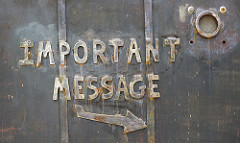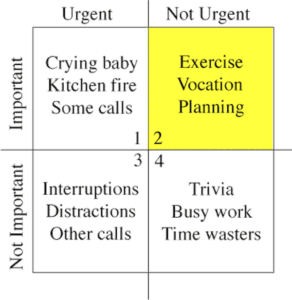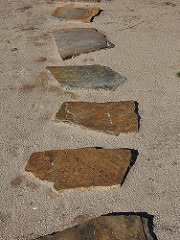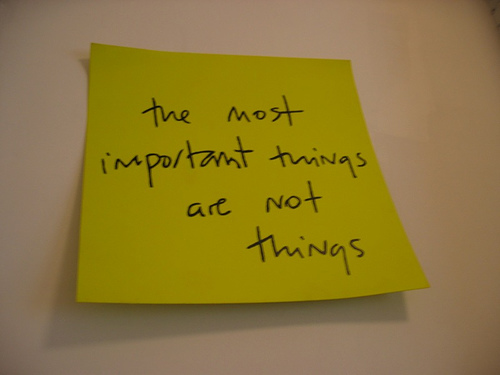How do we go about choosing what’s important?
Something is important when it has worth, value, or meaning. It may be of huge significance, but simple things can also be important, such as an act of kindness, time with loved ones, or a prayer.
Each day, we choose what to do and what not to do. As a steward of what we have been given, including our time and talents, we are meant to do important things. Too often, we choose not to.
Sometimes it’s out of insecurity or fear. Or because we lack a vision for our lives: we don’t dream big enough! More often, we simply get distracted by the mundane and find ourselves stuck—day after day, year after year—in the busy-ness of life. We focus on the wrong things and choose:

- What’s good instead of what’s great.
- The urgent rather than the important.
- To do nothing when we should do something.
- The easy thing, even if it’s not the right thing.
Choosing something great instead of just good
It’s deceptively easy to go a lifetime doing things that are good, but not great. Or, life can become a grand adventure, one in which we accept the role we are meant to play in God’s larger story.
We find our calling by focusing on how we are designed and where our passions lie. Then, we obey, and apply our God-given talents to a cause that’s bigger than us. Rather than settling for doing things that are expected, respectable, and safe, we can boldly follow a more important path.
What to do: Pursue our life calling
How to do it: Read “How to Find Your Life Calling”
Critical question: What do I like to do, what am I good at, and what gives me satisfaction?
Example: God designed my life calling using my circumstances, including struggles with alcohol, and my interests, such as writing and teaching. And he wants me involved in those things as a ministry to others. Pursuing God’s calling is a great privilege, so I am honored to do those things.
Good is the enemy of great. Few people attain great lives, in large part because it is just so easy to settle for a good life. (Jim Collins)
Choosing what’s important rather than urgent
 To determine what is truly important, Stephen Covey urges us to “begin with the end in mind” and “put first things first.” Developing a life plan will help us do just that, by building a vision for the future, prioritizing our objectives, and capturing weekly commitments on our calendar to help us move in the right direction one task at a time.
To determine what is truly important, Stephen Covey urges us to “begin with the end in mind” and “put first things first.” Developing a life plan will help us do just that, by building a vision for the future, prioritizing our objectives, and capturing weekly commitments on our calendar to help us move in the right direction one task at a time.
With that insight, we can then feel more confident ignoring things that are urgent but not important. This is critical to understand, because what we don’t do is sometimes as important as what we do.
What to do: Build a life plan and use it to schedule our time
How to do it: Read “How to Create a 1-Hour Life Plan”
Critical question: When I am on my deathbed, will I be satisfied with the choices I made?
Example: Security is an idol for me, and I sometimes feel an urgent desire to control our financial future. Having a life plan helped us make decisions that would have been tougher otherwise: my wife left work to stay home with the kids; the boys went to a private Christian school; I limited my career options by not moving; we contribute to our church; we invested in recovery programs for our family; and my wife and I devote a great deal of time to ministry. Together, those choices cost us hundreds of thousands of dollars, but we don’t regret a penny of it.
Most of us spend too much time on what is urgent and not enough time on what is important. (Stephen R. Covey)
Choosing to do something meaningful each day
 Doing nothing is a decision we make often, even when there is something we should be doing. We live by accident, ruled by indecision or procrastination, a victim of our emotions and desires.
Doing nothing is a decision we make often, even when there is something we should be doing. We live by accident, ruled by indecision or procrastination, a victim of our emotions and desires.
Instead, we can live on purpose. We don’t have to change the world, but we can do something each day that is meaningful. The 5 STEPS of Surrender, Transformation, Empathy, Progress, and Service can serve as reminders of important things we ought to be doing each day.
What to do: Use the STEPS to guide our choices every day
How to do it: Read “How Will You Live (Today)?”
Critical question: What steps should I take today along my life journey?
Example: The STEPS remind me to do simple, but important, things each day such as my morning quiet time, practicing self-awareness, investing in relationships, and pausing to help someone when given the opportunity. I need the STEPS, because I rarely feel like doing those things.
Choosing to do nothing is still making a choice. (Mark Batterson)
Choosing the right thing, not the easy thing
It’s incredibly tempting to avoid those tough decisions we know we should address. Sometimes, however, it is critical that we muster the courage to change what we can. Often, because something very important is at stake. Always, because it’s the right thing to do.
Other times, we need to accept with serenity things we can’t change. If we are control-oriented, that may be the hardest choice of all. The Serenity Prayer provides a useful tool for such decisions, and it can help us do the next right thing, one choice at a time.
What to do: Use the Serenity Prayer
How to do it: Read “Serenity to Accept, Courage to Change”
Critical question: What is the next right thing I should choose?
Example: Some of my toughest decisions have involved when to show tough love with my son and when to step back and let things work out as they will. Often, the right thing is not the easy thing, and it helps to have a spiritually-sound approach like the Serenity Prayer to frame the decision.
Every time you choose to do the easy thing, instead of the right thing, you are shaping your identity. (Hal Elrod)
Too often, we choose what is good, urgent, or easy rather than great, important, or right. Other times, we simply decide to do nothing. It doesn’t have to be that way.
You will make many decisions today on what to do and not do. What will you choose?
Question: What is something important that you can do today?
Action: Pick 1 of the 4 choices and practice it for the next month.
Photo by Patrick Denker  Photo by mikecogh
Photo by mikecogh  Photo by b.frahm
Photo by b.frahm 

